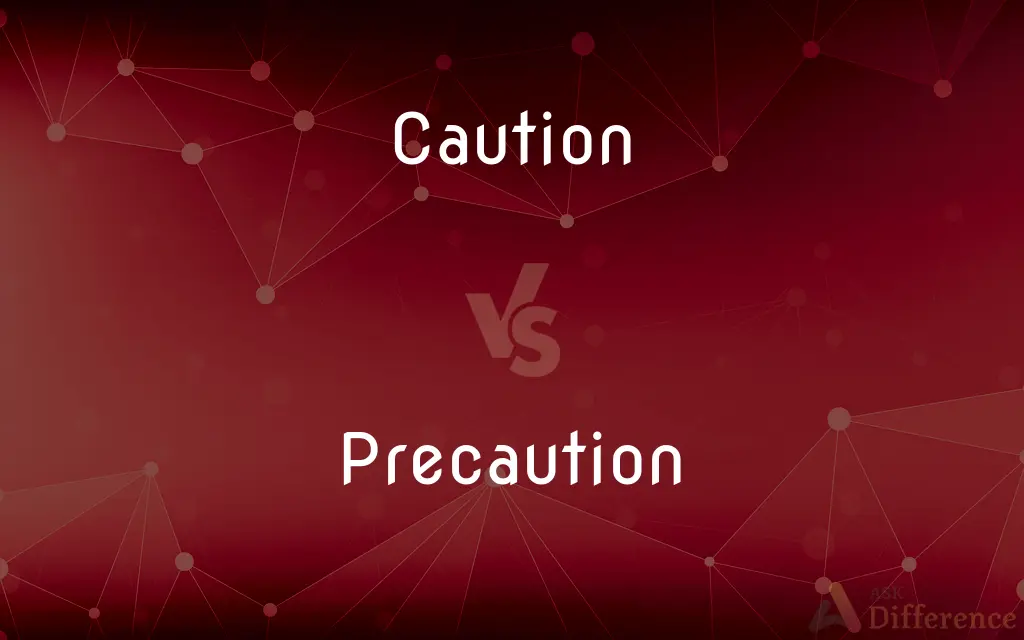Caution vs. Precaution — What's the Difference?
By Fiza Rafique & Urooj Arif — Updated on March 12, 2024
Caution involves careful behavior to avoid danger or mistakes, while precaution refers to measures taken in advance to prevent harm or risk.

Difference Between Caution and Precaution
Table of Contents
ADVERTISEMENT
Key Differences
Caution is the practice of being careful and avoiding risks or dangers in one's actions or decisions. It involves a general attitude of wariness and mindfulness about potential problems. On the other hand, precaution refers to specific actions or measures taken beforehand to prevent possible harm or danger from occurring. It implies a proactive approach to risk management.
Caution can be seen as a mindset or approach that influences how a person navigates various situations, emphasizing the importance of vigilance and carefulness. Whereas, precautions are tangible steps or strategies implemented to mitigate specific risks or threats, based on the anticipation of what could go wrong.
While caution may guide someone to think carefully before acting, precautions involve actually putting in place certain safeguards or procedures. For example, exercising caution might mean considering the risks before making a financial investment, while taking precautions could involve diversifying investments to mitigate potential losses.
Caution is often reactive, based on recognizing and responding to visible or immediate dangers. Precaution, on the other hand, is inherently proactive, involving planning and measures designed to prevent future risks or mitigate their impact before they materialize.
The distinction also lies in the scope of their application; caution is applicable in a broad range of contexts, from everyday decisions to major life choices. Precautions, however, are often associated with specific scenarios or activities where potential risks have been identified and measures can be taken to prevent them.
ADVERTISEMENT
Comparison Chart
Definition
Attitude or practice of avoiding risk and harm
Specific actions taken to prevent harm or risk
Nature
General mindset or approach
Specific, proactive measures
Application
Broad, applicable in many contexts
Targeted, related to specific risks or scenarios
Implementation
Mostly mental or behavioral
Involves concrete steps or strategies
Focus
Avoiding immediate dangers or mistakes
Preventing potential future harm
Compare with Definitions
Caution
Broad and applicable in various contexts.
The company urged caution in email communications to avoid phishing scams.
Precaution
Involves planning and preventive strategies.
Wearing helmets when cycling is a sensible precaution against head injuries.
Caution
Emphasizes vigilance and care.
Caution is advised when dealing with unknown substances in the lab.
Precaution
Proactive in nature.
Taking vitamin C during flu season is a common precaution.
Caution
Reactive to visible or immediate dangers.
The hikers proceeded with caution upon noticing the unstable terrain.
Precaution
Measures taken in advance to prevent harm.
As a precaution, they installed smoke detectors throughout their home.
Caution
A mindful attitude towards decision-making.
She exercised caution in her investments, thoroughly researching before committing.
Precaution
Targeted towards mitigating specific risks.
The factory implemented safety precautions to prevent accidents.
Caution
Practice of avoiding risks or dangers.
He approached the unfamiliar situation with caution, aware of the potential pitfalls.
Precaution
Related to specific activities or scenarios.
The construction site had multiple precautions in place to ensure worker safety.
Caution
Care taken to avoid danger or mistakes
Anyone receiving a suspect package should exercise extreme caution
Precaution
An action taken in advance to protect against possible danger, failure, or injury; a safeguard
Followed safety precautions when using heavy machinery.
Caution
An amusing or surprising person
‘You're a caution, you are,’ she said
Precaution
Caution practiced in advance; forethought or circumspection
A need for precaution when planning a vacation.
Caution
Say something as a warning
‘Be careful now,’ he cautioned
The Chancellor cautioned that economic uncertainties remained
Precaution
Previous caution or care; caution previously employed to prevent misfortune or to secure good
His life was saved by precaution
Caution
Careful forethought to avoid danger or harm.
Precaution
A measure taken beforehand to ward off evil or secure good or success; a precautionary act.
To take precautions against risks of accident
Caution
Close attention or vigilance to minimize risk
The car proceeded over the rickety bridge with caution.
Precaution
(transitive) To warn or caution beforehand.
Caution
Prudence or restraint in action or decision
Advised caution in choosing a school.
Precaution
To take precaution against.
Caution
A warning or admonishment, especially to take heed
I received a caution from the doctor about fat in my diet.
Precaution
Previous caution or care; caution previously employed to prevent mischief or secure good; as, his life was saved by precaution.
They [ancient philosophers] treasured up their supposed discoveries with miserable precaution.
Caution
A cautious action; a precaution
The climbers took the necessary cautions in preparing for the ascent.
Precaution
A measure taken beforehand to ward off evil or secure good or success; a precautionary act; as, to take precautions against accident.
Caution
(Informal) One that is striking or alarming.
Precaution
To warn or caution beforehand.
Caution
To warn or admonish
Cautioned him not to go swimming alone.
Cautioned that the findings were not conclusive.
Precaution
To take precaution against.
Caution
To give a warning or admonishment
Cautioned against overeating.
Precaution
A precautionary measure warding off impending danger or damage or injury etc.;
He put an ice pack on the injury as a precaution
An insurance policy is a good safeguard
We let our guard down
Caution
Prudence when faced with, or when expecting to face, danger; care taken in order to avoid risk or harm.
Take caution
Have caution
Exercise great caution
Utmost caution is required when travelling in this dangerous neighbourhood
Act with caution
Precaution
The trait of practicing caution in advance
Caution
A careful attention to the probable effects of an act, in order that failure or harm may be avoided.
The guideline expressed caution against excessive radiographic imaging.
Precaution
Judiciousness in avoiding harm or danger;
He exercised caution in opening the door
He handled the vase with care
Caution
Security; guaranty; bail.
Caution
(dated) One who draws attention or causes astonishment by their behaviour.
Oh, that boy, he's a caution! He does make me laugh.
Caution
(law) A formal warning given as an alternative to prosecution in minor cases.
Caution
(soccer) A yellow card.
Caution
(transitive) To warn; to alert, advise that caution is warranted.
Caution
(soccer) To give a yellow card
Caution
A careful attention to the probable effects of an act, in order that failure or harm may be avoided; prudence in regard to danger; provident care; wariness.
Caution
Security; guaranty; bail.
The Parliament would yet give his majesty sufficient caution that the war should be prosecuted.
Caution
Precept or warning against evil of any kind; exhortation to wariness; advice; injunction.
In way of caution I must tell you.
Caution
A pledge, bond, or other security for the performance of an obligation either in or out of judicial proceedings; the promise or contract of one not for himself but another; security.
Caution
To give notice of danger to; to warn; to exhort [one] to take heed.
You cautioned me against their charms.
Caution
The trait of being cautious; being attentive to possible danger;
A man of caution
Caution
A warning against certain acts;
A caveat against unfair practices
Caution
Judiciousness in avoiding harm or danger;
He exercised caution in opening the door
He handled the vase with care
Caution
The trait of being circumspect and prudent
Caution
Warn strongly; put on guard
Common Curiosities
Can caution exist without taking precautions?
Yes, one can be cautious without implementing specific preventative measures, though this may limit the effectiveness in avoiding harm.
Can being too cautious or taking too many precautions be detrimental?
Excessive caution or precautions can lead to fear of taking necessary risks or hinder daily activities, balancing is key.
How do precautions help in daily life?
Precautions can prevent accidents, reduce the likelihood of mistakes, and generally keep people safer in various activities.
What is the difference between caution and precaution?
Caution is a general attitude of avoiding risks, while precaution involves specific measures to prevent harm.
Is one more important than the other?
Both are important; caution informs the need for precautions, which in turn are the practical steps taken to avoid harm.
Are precautions always effective?
While precautions aim to mitigate risk, they cannot eliminate it entirely. Effectiveness depends on proper implementation and context.
Do precautions vary from one situation to another?
Yes, the nature and extent of precautions depend on the specific risks associated with different activities or decisions.
How do caution and precaution relate to risk management?
They are fundamental components, with caution guiding the recognition of risks and precautions being the practical steps to manage them.
Why is it important to balance caution and action?
To ensure that while risks are minimized, opportunities for growth, learning, and progress are not stifled by overcautiousness.
How can businesses implement caution and precautions effectively?
By identifying potential risks, fostering a culture of safety, and implementing specific, proactive measures to mitigate those risks.
How does caution affect decision-making?
It encourages thorough consideration of potential risks, leading to more informed and, ideally, safer decisions.
Can caution be taught?
While some aspects of caution are innate, awareness and mindfulness can be cultivated through experience and education.
Can technology help in taking precautions?
Yes, technology can aid in identifying risks and implementing effective precautionary measures through tools like alarms, sensors, and data analysis.
Is caution a form of fear?
Caution is not necessarily fear but a rational response to potential danger, aiming to avoid harm rather than stemming from irrational fear.
How do individuals' attitudes towards caution and precaution differ?
Attitudes can vary widely based on personal experiences, risk tolerance, and the specific context or scenario.
Share Your Discovery

Previous Comparison
Antidote vs. Vaccine
Next Comparison
Clarification vs. ClarityAuthor Spotlight
Written by
Fiza RafiqueFiza Rafique is a skilled content writer at AskDifference.com, where she meticulously refines and enhances written pieces. Drawing from her vast editorial expertise, Fiza ensures clarity, accuracy, and precision in every article. Passionate about language, she continually seeks to elevate the quality of content for readers worldwide.
Co-written by
Urooj ArifUrooj is a skilled content writer at Ask Difference, known for her exceptional ability to simplify complex topics into engaging and informative content. With a passion for research and a flair for clear, concise writing, she consistently delivers articles that resonate with our diverse audience.














































